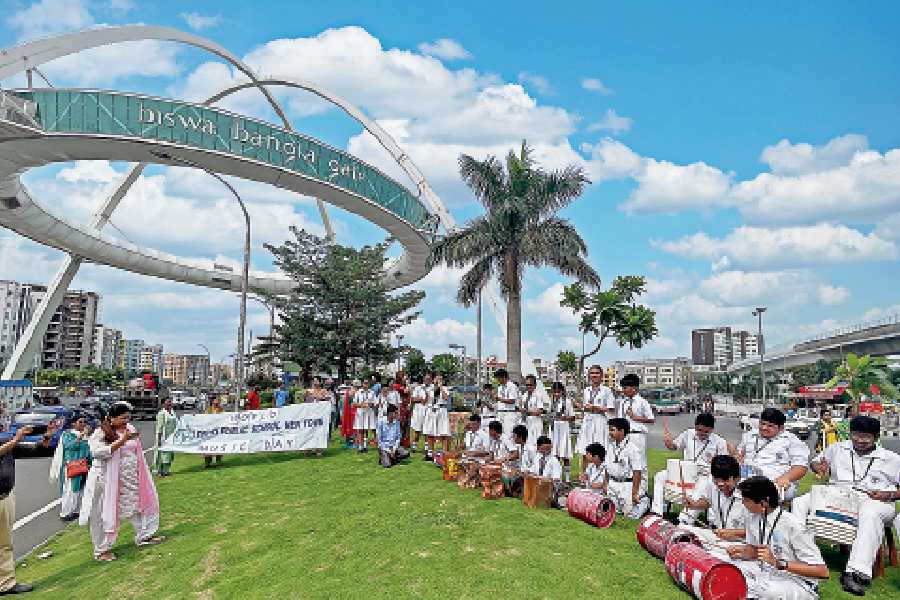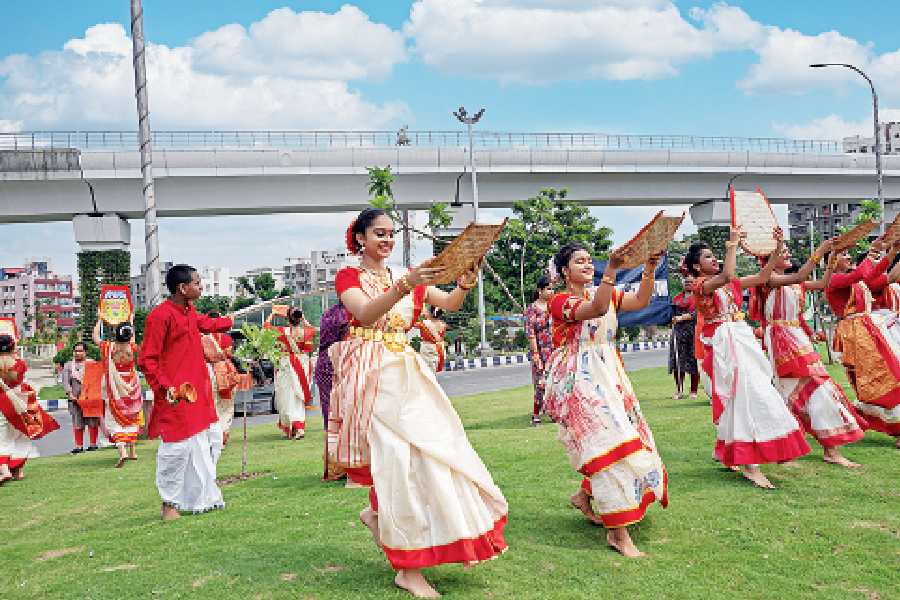Will it rain? What would happen if it does? The countdown to World Music Day, June 21, kept us on tenter hooks as the weather forecast showed a 50-60 per cent chance of showers on the day.
Our school, Delhi Public School Newtown, had decided to take the celebration out of the school auditorium to a rather unusual venue. Our school band of unconventional instruments (paint cans, aluminium tins, steel plates, empty buckets and the like, and even clapping), christened Staccato, would play in front of the township’s icon, the Biswa Bangla Gate, while we, the dancers, would perform to their beat.
The band completes a decade. In 2012, the school had won the runner-up trophy in Unconventional Beats, a contest organised by The Telegraph in Schools. This led to the formation of Staccato, which is conducted by our music teacher Surajit Saha. They have been performing in shows since 2017. The unconventional orchestra, he says, was born out of the idea of “reuse, reduce and recycle”, coupled with a passion for music.
In the early years, there were just three or four members playing buckets, plates and earthen handi. Since then, it has multiplied in strength, being extremely popular across age groups. On stage, there are about 10 or 12 of them at a time. But without the benefit of amplifiers that day, there were 32 of them playing, including half a dozen who would simply clap. Both the orchestra members and we were tense, having never been a part of such a public event, open to an audience of passing vehicles and pedestrians.
The music would be inspired by an innately Bengali tradition —Durga puja. And once the decision was taken about the programme, we had exactly three days in hand to get our act together. The preparation involved racing against time with long hours of practice, missing out on classes, staying back late after school and last but, not the least, sore muscles.
It was truly a Herculean task. Sitting in the bus in the morning on the big day, perspiring in the sweltering heat, we could not help but be glad for once about the oppressive weather. On reaching the spot — a grassy traffic island at the four-way crossing— we were greeted by the managing director of Hidco, Debashis Sen with a warm smile and words of encouragement which boosted our morale. Our principal Sonali Sen, too, cheered us up with her infectious energy and optimism.
Our vice-principal Ambica Mehra and our headmistress Rahi Mukhopadhyay were also present to support us in our endeavour. The unconventional orchestra, comprising a bunch of talented musicians from classes V to X, soon took position with their array of instruments, which to passersby must have seemed like a mass of throwaway objects.

The orchestra’s dhak-inspired beat and the donning of traditional Bengali attire by the dancers (red-bordered white sari for us and dhotipanjabi for the boys), with kulo and dhunuchi as accessory, created an ambience reminiscent of Durga puja
As they started playing, the air was filled with a harmonious symphony that transcended convention. Each note and each beat created a unique tapestry of sound, drawing upon traditional melodies, contemporary rhythms and experimental compositions. The only conventional sound they produced was sankhadhwani. The orchestra’s dhak-inspired beat and the donning of traditional Bengali attire by the dancers (red-bordered white sari for us and dhotipanjabi for the boys), with kulo and dhunuchi as accessory, created an ambience reminiscent of Durga puja.
It transported us all to the month of October and in our imagination, tall, white bunches of Kash flowers bloomed around us as if in full vernal glory on that June morning. They played a piece that was about a minute and 50 seconds in length, starting as soon as the traffic light next to us turned red. The performance was repeated thrice.
People in passing cars craned their necks to check out the source of the music they could hear from afar. Those who had gathered around the gate at that early hour became a part of the performance, watching the spectacle unfolding before them. The sound of their laughter, conversation and applause became a part of the soundscape, amplifying the energy in the air.
As we danced, we felt an overwhelming sense of liberation and joy. We spun, leapt, and twirled, our bodies becoming an instrument in harmony with the orchestra. Dancing in front of the BiswaBangla Gate with the unconventional orchestra was a transformative experience for each of us. “We have played in numerous shows, but the bustling streets were a welcome new change and a challenge. We did expect some awkwardness but on the big day, all we felt after the performance was pride and happiness,” said Ayaan Sinha, a Class IX student, who played a plastic bucket.
